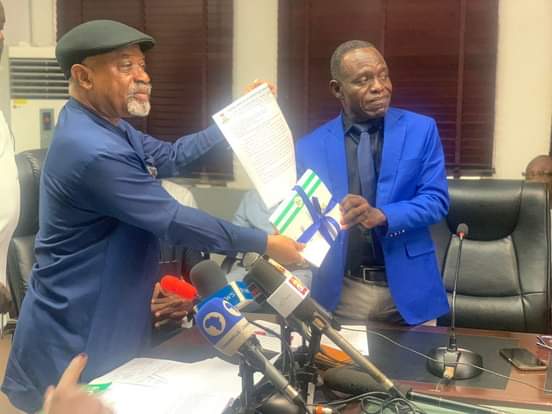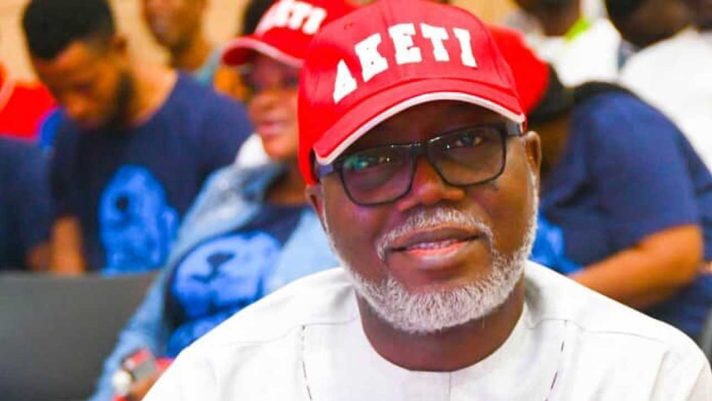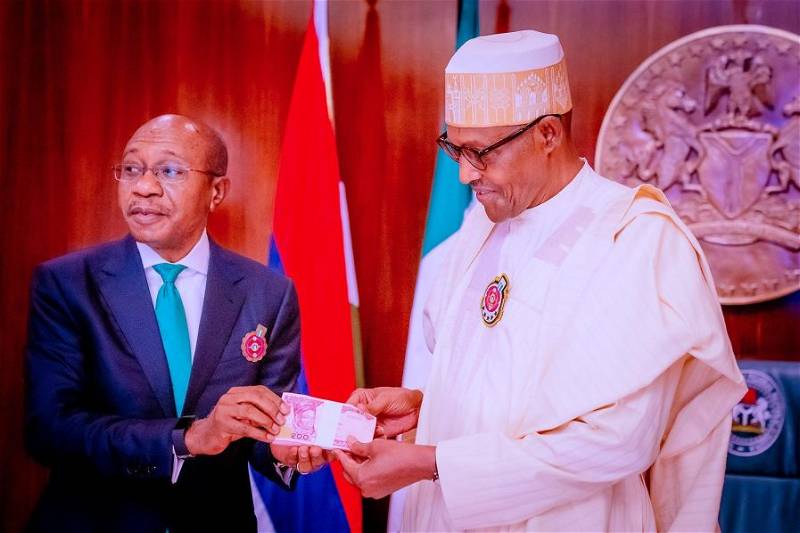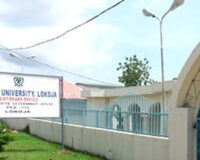Niyi Sunmonu, national coordinator of the Congress of University Academics (CONUA), has explained why the breakaway faction of the Academic Staff Union of Universities (ASUU) was formed.
Years after parting ways with ASUU, the federal government on Tuesday formally recognised CONUA as Chris Ngige, the minister of labour and employment, presented a certificate of registration to the union in Abuja.
The move has since sparked mixed reactions from stakeholders in the education sector, as many believe that it was an attempt to reduce the influence of ASUU amid its lingering strike.
In a letter dated October 7, 2022, and obtained by TheCable, Sunmonu gave a rundown of the disagreements that led to the breakaway from ASUU.
According to Sunmonu, the formation of CONUA was set in motion by events that occurred between 2013 and 2016.
He noted that in 2013, elections were duly conducted into various offices of the executive committee of the Obafemi Awolowo University (OAU), Ile-Ife, branch of ASUU but “regrettably”, the national executive council (NEC) of ASUU annulled the exercise “because the leadership of the union did not like those who emerged victorious”.
He said an ASUU NEC-favoured executive committee led by Caleb Aborisade was selected to run the affairs of the branch’s chapter.
He said the event spiralled into a crisis that rocked the process of appointing a new vice-chancellor for OAU.
“There was widespread dissatisfaction with the process which was perceived as manipulated, sometimes subtly and at other times blatantly, by the University Administration and the Governing Council, to produce a predetermined identifiable candidate as the VC,” he wrote.
“The Dr. Aborisade-led Executive Committee of ASUU-OAU was believed to be in cahoots with the University Administration and the Governing Council in the travesty.
“Meanwhile, the belief that the ASUU-OAU Executive Committee had been a collaborator in the unethical gambit that the VC selection process had started creating disaffection between the Executive and very many members of the union.”
He said rather than address the issue of dissatisfaction, Aborisade released a statement claiming that the VC selection “followed due process” and “was free, fair and transparent”.
HOW THE CRISIS WORSENED
He said the problems in the OAU branch were reported to ASUU-NEC, who in turn delegated Emmanuel Osodeke, the vice-president of the union at that time, to visit OAU to investigate the allegations.
“Professor Osodeke attended the Branch’s Congress, and members freely expressed in clear terms what the problems were, especially the unethical collaboration of the Branch Executive with the University Administration and Governing Council on the VC selection process. Despite appearing to see the problem and pledging to be objective, Professor Osodeke wrote and got to be published, seemingly by subterfuge, a report in which he claimed the selection “followed the process”, ostensibly in collusion with the branch Chairperson,” the letter reads.
“The impolitic and contemptuous action of walking out on Congress by the Dr. Aborisade-led Executive in response to queries regarding the gravely flawed Professor Osodeke-led committee’s report set in motion consequences unimaginably beyond the control of the Executive.”
He said thereafter, a three-person caretaker committee was nominated to steer the affairs of the union in the interim after the walkout.
“Niyi Sunmonu was named chairperson; Henri Oripeloye as secretary, and Monica Orisadare as financial officer,” he said.
“This redemptive Caretaker Committee ran the affairs of the OAU Branch of ASUU from 20th October 2016 to 12th February 2018, with popular support.”
He added that after “a fair hearing” by the investigation panel set up by the congress over sundry allegations against the suspended Aborisade-led executive, with the exception of M.O. Awoyemi (the treasurer), the executive committee was removed from office on December 14, 2016.
“About seven hundred and fifty (750) members subsequently signed, endorsing the removal, and the document was sent to ASUU-NEC in Abuja through the National President at the time, Professor Biodun Ogunyemi,” Sunmonu wrote in the letter.
He, however, said despite this, Ogunyemi sent two letters to the banks informing them that the only recognised signatories to the branch’s accounts were Aborisade, Saheed Adekilekun, and M.O. Awoyemi.
Then another letter dated April 10, 2017, informed the banks that Aborisade and Adekilekun would henceforth be operating the branch’s bank accounts while it excluded Awoyemi, who had been duly appointed as the mandatory signatory to the accounts.
“In other words, the National President unilaterally removed the Branch’s duly elected Treasurer, Dr. M. O. Awoyemi, who had neither been accused nor found guilty of any offence. The arbitrary directive to the banks from Professor Biodun Ogunyemi contravened the Constitution of the union, contradicted the National President’s earlier letter and violated the mandates to the banks,” he added.
ARBITRARY WITHDRAWAL FROM OAU-ASUU ACCOUNT
Sunmonu also alleged the transfer of about N11 million naira from the branch’s account to ASUU’s account which he said infuriated members of the university.
“At its meeting of Wednesday, 17th May 2017, the ASUU-OAU Congress charged the National President, Professor Biodun Ogunyemi, of being arrantly contemptuous of and further dividing the OAU branch of the union. It noted with disappointment that, at a time when there was a crisis in the branch, the President was only interested in our money and not how to resolve the crisis. His unilateral letters to the union’s banks to violate our mandates was regarded as a clear violation of members’ rights as contributors,” he said.
“Through the questionable set of circumstances, about eleven million naira (N11,000,000:00) was, cumulatively, transferred illegally from the ASUU-OAU bank account to the ASUU-National bank account. This unilateral, authoritarian and unconstitutional action of the National President of ASUU infuriated the mass of ASUU-OAU Branch members.”
He added that as the crisis of the ASUU-OAU worsened, an ASUU-NEC visitation committee was sent to the university to probe the issues raised.
In the end, it was recommended that some members of OAU-ASUU be suspended from the union and some others be expelled.
“The recommendations for suspension and expulsion were ratified on 4th February 2018 at the ASUU-NEC meeting held at Gombe State University. Hundreds of members of the ASUU-OAU were then suspended from the union for durations ranging from six (6) months to one (1) year, and members of the Caretaker Committee and some other members of the union were expelled outright from ASUU,” he said.
Sunmonu, however, said rather than heed the advice for the swift and pragmatic resolution of the branch’s crisis, ASUU-NEC was “more enamoured with wielding the big stick, without restraint”.
He said some of the members ASUU-NEC suspended or expelled from the union were very senior academics “some of whom were former and serving Heads of Departments, former and serving Deans of Faculties, former and serving Provosts of Colleges and even former and serving members of the OAU Governing Council”.
“To rub salt in the wound of especially these distinguished members of the OAU intelligentsia, ASUU-NEC set draconian and humiliating conditions for readmission into the union which no self-respecting academic would even contemplate to attempt to meet.”
FORMATION OF CONUA
Sunmonu said all these issues led to the formation of CONUA.
He said CONUA was formed to “provide a refuge for the academics who had been arrogantly driven out of ASUU was a key issue”.
He said the decision was taken at the ASUU-OAU congress that was held at the university on February 2018 and presided over by the caretaker committee.
“At the end of the discussions, Congress took the following key decisions: to constitute itself into a new Union that is totally independent of ASUU, adopt an appropriate name and open a new bank account for the check-off dues of its members,” he said.
He noted that membership of the union cut across all ranks of the academic profession, ranging from the entry rank of graduate assistant to the highest rank of professor.





